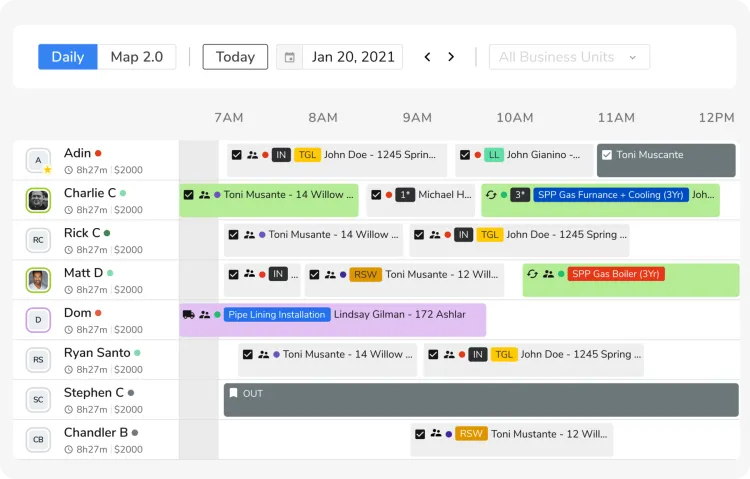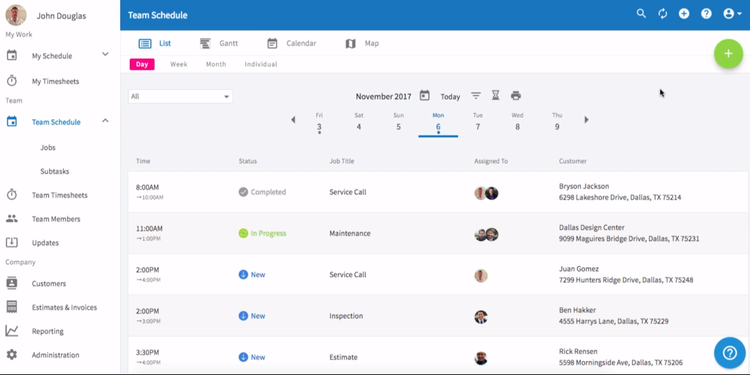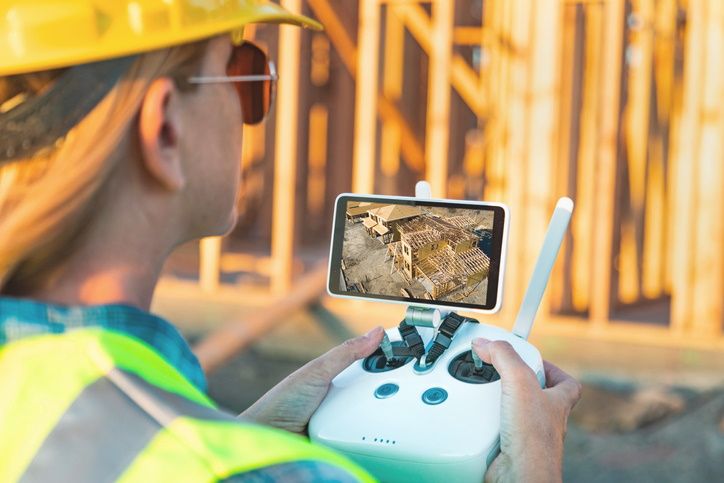What is Field Service Management (FSM)?
What is Field Service Management?
Field service management (FSM) covers any service work performed on a customer’s site rather than the company’s office, whether it’s installing telecommunication cables or performing on-site maintenance. Covering a wide range of industries, any off-site job can be considered “field” work. Management of these tasks requires special care to ensure those working away from a main office still have all the resources and support they need to get the job done. To streamline these tasks, companies often use a field service management system.
Types of field service tasks may include:
- Part or equipment installation
- Repair and replacement
- Preventive maintenance care
- Consultations
In some circumstances, field service management might refer to the organization of a company’s internal service teams. This is most common at large corporations or international enterprises, which need a dedicated, mobile workforce to ensure operational efficiency without requiring third-party service providers to come in to perform maintenance or repair tasks.
Generally, a good rule of thumb for determining if something falls under field services is to ask where the expected service is to be performed.
Key Components of FSM
Three of the key components of field service management are:
Scheduling Appointments
One of the first elements of field service management is the ability to answer service requests in a timely manner. The first task is to determine the client’s and your staff’s availability. If the job requires a specialist, you’ll need to consider that when creating a schedule. By being flexible with appointments, you can increase customer satisfaction by meeting them based on their availability rather than restricting them to inconvenient times.
A service scheduling system helps you keep tabs on each appointment and the assigned technician. If any changes arise, such as a customer modifying their service request, you can use the system to update the dispatch appropriately.
Work Orders and Contracts
Once work has been scheduled, you need an official work order and contract with the customer. The work order creates an internal link between different departments to ensure the job gets done. A manager or supervisor can approve a service request and assign it to the most relevant field technician, whether it’s someone with special qualifications or whoever is available at the time, depending on the needs of the job.
The customer contract may begin with a quote or estimate, and then the information can be used to develop an accurate invoice once the work is completed. Depending on the business, the invoice might be delivered to the client before work begins. Regardless, the contract will lay out a payment plan so both parties are on the same page regarding finances.

Dispatch Management
When it’s time to do the job, you must coordinate dispatch efficiently with optimized routes based on job times and locations. Service dispatch software can streamline this by automatically finding the most optimized routes for the dispatch team. Also, distinguish which personnel is best for each job: a service technician or a specialist.

Asset and Inventory Management
Finally, you need to handle your assets and inventory management to operate a successful field service business. With technicians often coming and going between jobs, it can be hard to know where certain assets are at any time. Did an electrician drive a fleet vehicle to a remote job without properly checking it out, or is a vehicle missing? Is the storage shelf empty because an exterminator brought some extra bottles of pesticide to a job site just in case, or are you out and need to reorder your stock? Tracking inventory and assets can help you keep costs down by knowing what’s gone and where it is.
Every item you use during a job can be considered an asset, whether a highly specialized machine or an everyday tool. Depending on the size of your company, your asset management can cover dozens to millions of things crucial to your workflow. With some equipment costing thousands of dollars, you need to know where and what condition they are in to prevent losing money from broken or missing assets. New advances in tracking technology paired with easy-to-use mobile devices make it easier than ever to always know where important assets are in real time.
Benefits of Field Service Management
FSM can have major positive impacts on service businesses, especially when software is implemented. These benefits include:
- Reduced Costs: Companies can save a lot of money by streamlining processes and making tasks more efficient. This allows revenue to be maximized and jobs completed with minimal material waste.
- Improved Customer Satisfaction: FSM can help ensure your technicians arrive at jobs on time with the right equipment and resolve issues in a timely manner. Consistently staying on schedule for every customer will translate to better satisfaction.
- Empowering Technicians: Technicians require real time access to job details while out in the field, which FSM can provide. You can stay in contact with all your workers to assist with troubleshooting, compliance, and safety concerns to perform jobs correctly the first time.
- Better Data: FSM connects the back office with workers in the field, allowing data to be communicated back and forth. This helps management optimize processes through data analysis, while technicians use real time data to stay informed about the current job.

Field Service Industries
Field services cover a wide range of industries. Essentially, any skilled work which is performed away from a central location can be considered the “field”. However, these are some of the key industries:
- Plumbing and HVAC
- Electrical
- Roofing
- Maintenance
- Lawn Care
- Landscaping
- Pest Control
- Healthcare (In-Home Care)
- Property Maintenance
Every industry has slightly different needs. For instance, a roofing or lawn care company might need to adjust their service scheduling calendar on a seasonal basis. Plumbers and electricians would need the same appointment coverage year-round. Fortunately, there are specific solutions available for developing industry-specific field service management systems.
Industry Trends
Modern technology has greatly expanded the capabilities of field service businesses. Mobile apps and cloud-based software make it possible to work anywhere with real-time updates. Evolving field service management tools improve safety conditions at even the most remote sites. Even something as simple as customizable templates makes it possible to directly import data from your bids onto invoices without additional formatting, saving time and effort on each job. Learn more about the trends currently influencing field service management:
Mobile Tools
Safety is always an important part of every job, regardless of industry. Field service operations can often be dangerous, both due to the nature of the work itself and the remote locations far away from emergency care centers. In the past, an accident involving a forestry official in the middle of the woods might not have been reported for hours until someone could have reached a phone. Even walkie-talkies offered only limited communication. Now, the rise of mobile capabilities means field service technicians have more ways to communicate while working, whether it’s with other service team members on the job site or someone back at the main office.
Machine Learning and AI
Artificial intelligence (AI) has also streamlined these services by allowing for remote monitoring and easier on-site diagnostics for field workers. To start, this tech can use algorithms to determine predictive maintenance schedules, saving field service workers from manually checking up on equipment that does not need service. Paired with field service software, you can say goodbye to a lot of time-consuming manual tasks by handing them over to AI.
Automation
Finally, automation has led to more streamlined field service tasks across every industry. Scheduling appointments, calculating estimates, and sending out invoices can all be done in an expedited manner thanks to new software. All of this can improve the customer experience, leading to higher satisfaction and a greater chance of client retention and new referrals in the future. It can also increase profitability, as you and your team can spend more time working in the field instead of filling out paperwork in the back office.

Field Service Management Software
Field service management software, also known as FSM software, automates many of the back-office tasks necessary to create quotes, dispatch field technicians, estimate costs, and generate work orders. Service organizations of all sizes can utilize FMS solutions, ranging from single-person operations to full-scale franchises.
For instance, intuitive drag-and-drop features make it easy to rearrange schedules based on changes in availability or customer priority. Other features streamline basic accounting related to quoting and invoicing. And shared dashboards show job status to everyone in the company, making timely responses easier than ever. Through the latest FSM software, you can optimize your entire operation and enjoy all the benefits of field service management.
